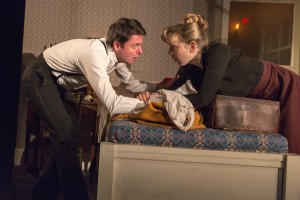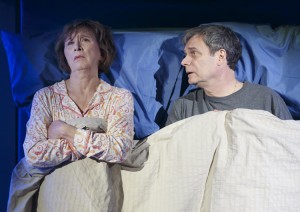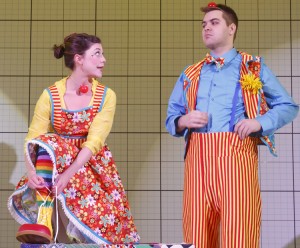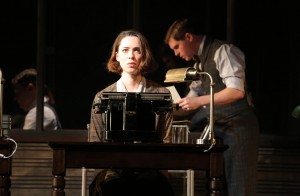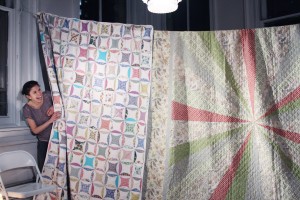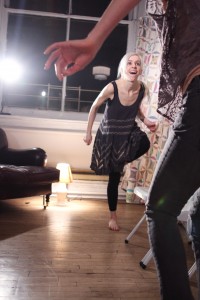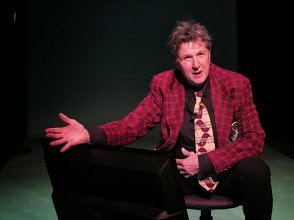"The younger rises when the old doth fall." So describes one of William Shakespeare's most dramatic plots to ever grace the stage. Based on ancient Celtic legend, the Bard's King Lear is considered one of the most tragic of his plays; its original intended ending had been altered for centuries up until the mid- to late-eighteenth century for this very reason. For many, the story is familiar: an aging king seeks to pass on his estate to the daughter who professes her love the most. However, the king goes mad by the betrayal and greed that quickly engulfs him. Titan Theatre Company's production, now playing at the Queens Theater, keeps this legend of King Lear alive with its signature contemporary take on the classic.
The company's King Lear is turned into an intense, action-packed conspiracy thriller; instead of the overthrow of a kingdom, here corporate greed reigns supreme. At the top of the ladder, undoubtedly, sits King Lear (Terry Layman) himself, with an array of characters on the lower rungs eagerly awaiting his downfall. Among them are his daughters, Regan (Laura Frye) and Goneril (Leah Gabriel), with their respective husbands Cornwall (John Taylor Phillips) and Albany (Greg Oliver Bodine), in tow. Upon Lear's announcement that his estate shall go to whomever amongst his daughters declares her love the most, the two scheming daughters immediately shower him with excessive flattery, eager for a share in the estate. When it comes time for Cordelia (Susan Maris) to speak, she refuses to act as her sisters do, opting a more honest approach in regards to professing her love. This upsets the old king, who decides to disown Cordelia and divide the share between his two other daughters. Meanwhile, Gloucester's (Michael Selkirk) illegitimate son, Edmund (Tristan Colton), resenting his status, seeks vengeance upon Edgar (Brendan Marshall-Rashid). He composes a letter which is sent to their father, leading Gloucester to think Edgar is plotting against the estate. The string of events which follow lead to various acts of betrayal, greed, madness and cold-blooded murder.
Like many of their previous productions (such as their off-Broadway-bound Midsummer Night's Dream, reviewed here), Titan's King Lear is a perfect amalgamation of the classic and modern. Jasmine Nicole Roberts' ethereal and abstract set design contrasts against the blunt lines of Scott Frost's suit-and-tie costumes for many of the principal characters. The black-and-white motif which runs through the two production elements — from the curtains to their costumes — is an interesting way to represent the world of King Lear, which is not so cut-and-dry, and in which there are many gray areas in terms of friend versus foe. There are instances of pops of color, many for symbolic use: both Regan and Goneril can be seen wearing blue blouses, as opposed to Cordelia's plain white; ensemble members of the cast (such as Kent and Edgar) are decked out in more earthy colors. Other design elements such as Weston G. Wetzel's lighting and sound design make already powerful scenes all the more dramatic. In addition, the idea of various company members doubling as stagehands and changing set pieces between scenes is an effective device that should be used more often in the theater. If scenes in real life changed as as dramatically as they did in King Lear, then real life would definitely be more interesting.
It is Titan's ensemble, as evidently demonstrated in A Midsummer Night's Dream earlier this season, that remains a strong presence onstage — as a group and individually. Layman's Lear was anything but one-note; he was humorous, commanding and moving to watch and when he met his tragic end, you felt his sadness, too. As his scheming daughters, Frye and Gabriel were deliciously devious, and played great foils to Maris' forthright but loving Cordelia. As Edmund, Colton gave off a rebellious edge opposite Marshall-Rashid's equally noteable performance as the wronged brother. Other honorable mentions include R. Scott Williams as the wonderfully flamboyant and witty Fool, and Brad Makarowski as the gallant Kent.
If everyone's downfall played out with as much suspense and thrill as it does in Titan Theatre Company's King Lear, then we should all be glad to go — honor still intact, and guns ablazing.
King Lear is playing at The Queens Theatre (14 United Nations Avenue South) in Flushing Meadows Corona Park until May 11. For tickets and more information about this production, visit www.titantheatrecompany.com or www.queenstheatre.org.











